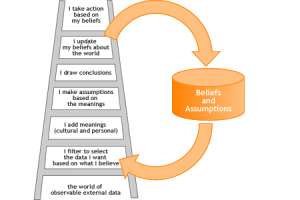It happened again this week. I was going along merrily about my business when I read something very disturbing on someone’s Facebook page. It was one side of a multi-faceted, distasteful, eye-opening situation affecting a significant number of people personally and about which most of the rest of us had an opinion. I took an opinion too, way too early in the game. And, I found myself at the top of the Ladder of Inference feeling embarrassed by my rush to judgment and having to climb my way down again by taking back words I had written in haste and with insufficient thought.
I don’t suppose it will be the last time I’m going to rush up the ladder. However, it is a goal of mine to ensure fewer occurrences. The air is far too rarified up there for critical thought to successfully cancel out, or at least modify, the rush of emotion that fuels an ill-considered journey to the top.
It is with this in mind that I’m re-publishing this post about the Ladder of Inference, just in case, along with me, you also could use a refresher course.
==================================================
 The other day, while at the supermarket, I was reminded of how easy it is to make assumptions about people. It happened while I was going through the checkout counter. Behind me, were a mother and her little boy, who looked to be about three years old. Together, they had two carry baskets brimming with grocery items.
The other day, while at the supermarket, I was reminded of how easy it is to make assumptions about people. It happened while I was going through the checkout counter. Behind me, were a mother and her little boy, who looked to be about three years old. Together, they had two carry baskets brimming with grocery items.
Realizing she had forgotten something, Mom left the queue to go and get it, suggesting to her son that he begin to put the items they had already collected on the counter. He was very small. In fact so small his ability to comply with this suggestion was in some doubt, at least in my mind. But, soon he was grabbing each item and chucking it as high as he could over his head so that it landed, rather unceremoniously, on the counter above him. He was doing fine until he came to a can of soup. After heaving this in the direction of the other items, it landed on its side. Being fearful that it might roll off the counter and hit him on the head, I took the can up and set it aright, thinking I was doing him a service.
The little boy gave me a filthy look. He looked at the can. Then he looked at me and scowled. And, when his mother returned from her quest, he said, “Something’s not right”
Mom, not really understanding what her son was on about, asked him what was not right, at which point, I said,
“I think he’s referring to me. I righted the can of soup so it wouldn’t roll off the counter. I was trying to help”
To this, the little boy raised himself up to his full height of maybe three feet and loudly proclaimed, “I didn’t want any help!”
While a little stunned by the vehemence of his words, I quickly apologized to him, received some words of thanks from Mom and then decided it might be best if I minded my own business.
Thinking about this story, The Ladder of Inference comes to mind. It was developed by Chris Argyris and made known in Peter Senge’s book The Fifth Discipline. It works something like this:

http://www.strategyworks.co.za/2004/11/05/the-ladder-of-inference/
At the bottom of the ladder is information that is clear and observable. In this case, I saw a little boy helping his mother with the grocery shopping. I saw too, that there were a lot of groceries and that the little boy was really small.
I climbed to the second rung from the bottom where I narrowed my focus and selected only the data that interested me. In this case, I concentrated on two things, the little boy and his attempts to hurl grocery items onto the counter above him.
I climbed to the third rung of the ladder and began to make assumptions. First, I assumed that because he was small, he was not really capable of fulfilling his assigned task. And then, I assumed he needed help.
I climbed to the fourth rung of the ladder and concluded, based on these assumptions, that he would be glad of my help. From there, I proceeded to the fifth rung where I connected this conclusion to my belief that helping each other is an important and natural part of the human experience.
When I got all the way to the top of the ladder and acted in accordance with my assumptions and beliefs, I was met with hostility rather than the appreciation, or at least the neutrality, I was expecting.
The point is that it is easy for us to run up the ladder and get things wrong even when we have the best of intentions. Had I simply asked the little boy if he would like help in unloading his groceries (or in his case UPloading his groceries), I would have had the answer I needed, respected his wishes and stayed out of trouble. But I didn’t. So I didn’t.
All of which brings me to this…Good leadership can falter quite easily too, if we fail to check out and validate assumptions before we act. For instance, before every meeting you hold do you assume that everyone knows why you are meeting? Do you assume that everyone will have everything they need to fully participate in the meeting?
What other assumptions might you be making when you interact with those who follow your lead? How accurate are they? What steps might you take to prevent a trip up the Ladder of Inference? What questions might you ask?
Have you other thoughts you can share?
In the meantime and on the lighter side, this is what Oscar Wilde thought about assumptions, courtesy of Benny Hill.


